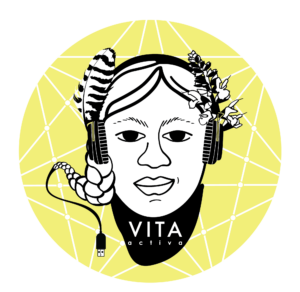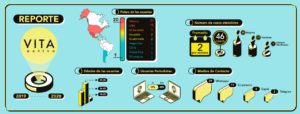The increase in online harassment against women journalists is a trend in Latin America and has real impacts on the lives of these professionals and on press freedom. According to a 2018 survey by the International Women’s Media Foundation (IWMF) and Troll-Busters.com, about 30 percent of women journalists have considered leaving the profession and almost 40 percent have avoided certain reports after online attacks.
Faced with this scenario, organizations have launched courses, training or guides on the subject and, more recently, started to provide personalized and free assistance to women journalists who suffer online harassment. This is the case of IWMF, which, in recent months and driven by the pandemic, has started an online individualized digital security consultancy service for journalists, in English and Spanish.
Since 2019, another organization, Vita-Activa.Org, has offered a helpline aimed mainly at women journalists, activists, human rights defenders and members of the LGBT community facing online harassment. The helpline provides psychological first aid, comprehensive crisis and digital security management and strategic decision-making.

Nadine Hoffman (Courtesy)
According to IWMF deputy director Nadine Hoffman, who is responsible for the foundation's projects on online harassment, it is necessary to invest in resilience because this is a problem that is here to stay.
"The reality is that this will continue to happen, it won't go away anytime soon, and will continue to affect primarily women and journalists of colour. So what are the support systems we can put in place to help them to stay in the industry and stay on their stories, so that they don't have their voices silenced?" Hoffman said in an interview with the LatAm Journalism Review (LJR).
Hoffman explained that online attacks are indeed effective in curtailing press freedom; there is a "chilling effect.” “The trolls got what they wanted, because the journalists decided either not to cover a specific topic or a specific story, because they didn't want to deal with that retaliation online,” she said, regarding the 2018 survey.
Not only is this a problem that will not be resolved quickly, but something that has worsened in recent years. “I would say that, globally, the situation is worsening, because it is almost as if governments are looking at each other's playbooks, so they see what Duterte is doing in the Philippines [and copy it].”
The pandemic also served to fuel online attacks against journalists in the world and in Latin America, especially against those who investigate corruption or critically cover government responses to COVID-19, Hoffman said.
“Governments have been using the coronavirus pandemic for a broad crackdown on press freedom. Specifically within Latin America you are seeing an increase in state sponsored digital attacks, bots, all kinds of online harassment. You've got governments like [Jair] Bolsonaro in Brazil, or AMLO [Andrés Manuel López Obrador] in Mexico, or [Nayib] Bukele in El Salvador, who have really created these troll armies and have brought about such a hostile environment online that also has real world repercussions for journalists,” she said.
The pandemic, however, also helped the IWMF offer a new service, a virtual and individualized digital security consultancy for journalists who are victims of online harassment. To request assistance, simply fill out a form on the IWMF website. This type of personalized consultancy had already been provided since mid-2019 by the organization, but in person, at journalistic events. Since then, 21 journalists have been assisted, five from Latin America.

Ela Stapley (Courtesy)
Since the form was made live, the demand for this type of support has increased. Ela Stapley, who is a digital security consultant at IWMF and responsible for answering in Spanish and English, said the conversations are made through encrypted messaging services, such as WhatsApp and Signal, and last between 45 minutes and an hour and a half.
“Normally we get cases when there has been a change, like a change of government. We're seeing this in El Salvador, I'm getting an uptick, an increase in people from El Salvador,” Stapley told LJR. In general, the cases received globally involve online trolls and surveillance, which can be from the State or not, account hacking, theft of photos and personal data for blackmail, among others. She also assists women who have been detained and had their equipment handled by authorities, for example.
In situations of online attacks, Stapley suggests some steps to increase security. The first recommendation is to check what information about the person is publicly available on the Internet and to take steps to remove or control that data. Another guideline is to make accounts more secure, to prevent hacking. So Stapley teaches how to create strong passwords and enable two-step verification, for example. She also advises the journalist to talk to friends and family, their closest contacts, about the risks they take and how they can protect themselves.
“Quite often if they can't attack you they will come after your family. [So it's important] not just telling them [to improve their account's privacy], quite often you have to sit down and do it for them, because older generations don't understand what public information is online,” Stapley explained.
She said that journalists seek the service in an emergency, after or during an attack. And because of that, Stapley ends up also providing a kind of emotional support, which, according to her, takes up most of the consulting time.
“It's inevitable. When people call you to talk about that case, they are not going to just talk about the digital security aspect. Even though I say to them, please, you don't have to relive the trauma, just focus on the digital security elements, it's almost impossible for them to do that. Quite often they have to tell me the whole story,” Stapley said.
That's because many women who call Stapley have just been arrested, had their accounts hacked, or have received death or rape threats, so it is natural that they are emotionally shaken. “So I try to give them easy to use advice, as simple as possible, because when you are in that state of mind it's really difficult to practice digital security,” she said.
Stapley believes that this is a common feature of personalized service, the need to listen to the journalists' story calmly and provide some emotional comfort. If on the one hand it means this service takes more time, on the other hand, it makes it more efficient in emergency situations, Hoffman said.
"I think it's important to have this one-on-one support, because while there is a lot of digital training, resources and guides available related to online harassment, when you are in the middle of a particular attack, it's kind of hard to know where to start and it can feel quite overwhelming,” she said.
To think of other ways to deal with online harassment and prevention actions, the IWMF organized a coalition, which was formally launched in the middle of this year, to join efforts, map the resources already available and discover the gaps, to strengthen the system of support for women journalists. In the scope of prevention, the IWMF has invested in training, such as the Knight Center's free online course in English, "Online Harassment: Strategies for Journalists’ Defense," which starts on November 16 and is now open for registration.

Mexican journalist Luisa Ortiz Peerez, co-founder of Vita-Activa.org
Psychological first aid
It was precisely by noting this important emotional component during an online attack that Mexican journalist Luisa Ortiz Pérez decided to create a help line that offers psychological first aid.
Ortiz, who is the executive director and co-founder of Vita-Activa.Org, realized that women journalists had difficulty assimilating and understanding the guidelines of digital security experts while experiencing episodes of online harassment.
“If a journalist was doxxed, if her private data was disseminated, if there was pornography with her face, if she was sexually harassed by her bosses or on Twitter, the answer was always talk to the technician. Which is generally a young boy who says: the problem is your password, do this, solves that problem. Asking the women, they said: ‘Yes, of course, the techs come, they ask us questions, and we don't listen to them,’” Ortiz told LJR.
After much research, she concluded that communication difficulties did not mean that women did not care about the topic, but it was related to an emotional issue. Ortiz dedicated herself to studying nursing and psychological first aid and discovered that people who are victims of natural disasters go through the same situations.
“After Katrina in New Orleans, for example, people could not write a check at banks, because they were at a level of post-traumatic stress that did not allow them to understand certain processes that appear to be rational. So, the issue is not that they don't understand, it’s that they are not psychologically in a condition to understand or make a decision. If you just saw an image of your boyfriend and you having sex on Facebook, do you think you will remember your password? Who is going to be thinking of a damn password [at that moment]?”, she explained.

Vita Activa Logo (Courtesy)
Therefore, the Vita-Activa.Org helpline has a different approach for these cases. First of all, the companions, who carry out this service as part of the organization, ask those who seek the service: "How are you? How are you feeling?" And, before offering solutions, they ask the journalist how she wants to solve that problem.
“It is revolutionary. [...] We sit down to listen, we accompany the person, and once they can understand what is happening, we present options for them to decide. Do you realize that it is a very different language? Listen, understand, decide, solve. [We ask the person:] Do you want to go to the police? Ok, let's see what you need. Do you want to go to the doctor? To church?” Ortiz said.
The service, available in English, Spanish and Portuguese, is always free, confidential and anonymous. Neither the companions nor the people assisted are identified, for the safety of both parties. Audio or message conversations are carried out by Whatsapp, Telegram or Signal, at +52 155-8171-1117.
The line was launched in April 2019 and, in the first year of operation, helped 46 people, most of whom, almost 70 percent, were women – Vita-Activa.Org does not deny service to anyone, so men also are welcome, although the focus of the line is women and LGBTIQ + community members. Journalists account for more than half of the cases, 52 percent. And the public is mostly from Latin American countries, mainly Mexico, El Salvador, Guatemala and Ecuador.
More recently, with the pandemic, the number of consultations has exploded, going from an average of two a week to two or three a day, Ortiz said. From August to October, Vita-Activa.Org opened Community Support Circles in five countries in South and Central America – the circles are closed and private groups on WhatsApp, where people from the same country receive group support.
Currently, Vita-Activa.Org has about 15 companions, mostly women and non-binary people, from different countries in Latin America and the United States. The organization supports itself with a mixed financing model, which includes workshops, training and international cooperation.
The companions receive compensation for the service and do not work more than three times a week, to avoid emotional exhaustion. “Vita promotes the culture of self-care. Martyrdom, heroines... that's not the idea.” The organization wants to grow, and this month they are looking for volunteers for an emergency mental health effort for journalists during elections in the United States.
Companions receive psychological first aid training, but are not therapists or psychologists. The service is based on a "peer-to-peer" model, Ortiz explained.

Annual report from Vita Activa (Courtesy)
“The requirement is that they are journalists or have worked in media, because that way they have a common past that we do not have to explain. Having your peers and allies in the conversation reduces the trust curve that is the biggest problem in trauma situations. That is called cutting red tape.”
The line also encourages self-care, something that is still uncommon in the news media. Ortiz pointed out that it is not possible to separate the digital body from the physical and, many times, journalists who experience various types of violence, including online, present real symptoms and diseases. That is why, according to her, it is necessary to have a cultural change that rethinks work stress, mental health and the lifestyles of journalists, which also means taking digital attacks more seriously.
There is a mentality in newsrooms that makes it difficult for women to report this type of violence online, Ortiz warned. “The old school of journalism is fully to blame for what is happening to us. The objectivity, the tough skin, the journalist who drinks to sleep at night and wakes up perfect, the bad salaries, sexual harassment in the office, all those things, like Mad Men style, are from a generation that broke journalism. The systemic failures of journalism promote a toxic lifestyle,” she said.
As a result, many journalists tolerate online attacks in silence for years, and when the cases reach the organization, they are much more serious, Ortiz said. “Journalists have such a high level of tolerance that many of them only worry until they are hit in the face with it. I ask them: Hey, but how long has this been going on? And they tell me: Well, for a couple of years. I don't pay attention to it, I continue with my work. But I don't sleep, or I got divorced, I have diabetes ... If I could have my headline on the globe I would say: The number one cause of death for women journalists is stress.”
This story was originally written in Portuguese and was translated by Teresa Mioli.